 WHITEHORSE, YT—Yukon Citizens’ Assembly on Electoral Reform (YCAER) has received concerns from the public on mailouts and polling being conducted by groups advocating for specific outcomes.
WHITEHORSE, YT—Yukon Citizens’ Assembly on Electoral Reform (YCAER) has received concerns from the public on mailouts and polling being conducted by groups advocating for specific outcomes.
“The Citizens’ Assembly has not engaged any polling, nor have we sent literature to Yukoners,” said YCAER Chair Sara McPhee-Knowles.
“We have received calls and emails from people who are upset at the polling and materials received because the groups engaging in such activities are not clearly stating they are in no way affiliated with the work of the Citizens’ Assembly.”
“It’s challenging, because such activities may cause Yukoners to doubt the Citizens’ Assembly process if they think members have already reached a conclusion—which they have not.”
“At this point in our process, Assembly members have undertaken a huge amount of learning about different potential voting systems, and determined the values that will guide their deliberation and discussion during the next two gatherings.” said McPhee-Knowles.
Any outreach from YCAER this summer will not advocate for any specific outcome.
“We very much want to hear from Yukoners on electoral systems and electoral reform. Our website is accepting written, video and audio submissions until August 12th. Every submission is publicly available and shared with the Assembly,” said McPhee-Knowles.
YCAER is issuing a poster to raise awareness about the Citizens’ Assembly, including how to learn more and have your say. The poster can also be downloaded from the YCAER website, printed and posted in your community.
Yukoners interested in learning alongside Assembly members can view, listen and read about the learning sessions conducted thus far, plus all materials presented to the Assembly at yukoncitizensassembly.ca.
The Yukon Citizens’ Assembly on Electoral Reform (YCAER) is examining and discussing different ways of electing our territorial government. By Oct. 31, the YCAER will recommend either keeping our current voting system or adopting a different system.
Citizen Assemblies are a public learning process and a problem-solving process. They begin with the assumption that the public is a resource, not a risk. They are a special public trust given a seemingly impossible, but essential, task.
Assembly members are not direct representatives like MLAs and MPs. They are private citizens participating in an act of public service, much like those selected for jury duty.
Since 2007, more than 1,900 Canadians have volunteered 71,000 hours (about 8 years) to support more than 50 different Reference Panels and Citizens’ Assemblies. 1 in 32 Canadian households has received an invitation to serve in one of these long-form deliberative processes.
